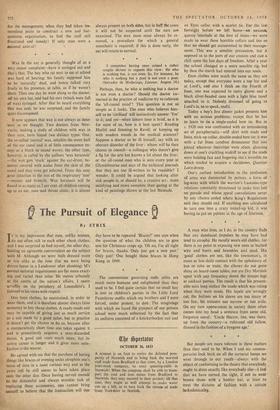A Doctor's Journal
Morale in Industry
By MILES
HOWARD
How much tension and frustration in industry could be avoided by better organisation? Professor Norman Hunt, of Edinburgh, said lately on the Third Programme that in his ex- perience firms of very diverse kinds face problems that are essentially similar. In his courses and seminars for advanced management, the partici- pants soon find that their troubles, which they supposed to be unique, are shared by managers in other branches of industry; in many cases, research has already been carried out on these very points and a practiCal solution may have been found.
Professor Hunt also referred to a Yale study on the incongruity between the needs of the healthy human personality and the demands of traditional forms of organisation. In his develop- ment from infant to adult, the individual moves over from a passive to an active state, his per- spective lengthens and his skills multiply. But at work he may be obliged to accept an environ- ment where he is expected to be passive, de- pendent and subordinate and take a short-term perspective; he is encouraged, indeed compelled, to practise and to value a very few and super- ficial skills. No wonder, then, that mentally backward people do so well in some industrial jobs. Work already done in this field, such as the study by R. M. McKenzie on the human factor in inspection, has tended to show up the faults in the present patterns of organisation. What is needed now is a series of inquiries directed towards the formulation of new patterns, and these may call for some reversal of the trend of so-called 'scientific' management : increasing the significant content of jobs rather than sub- dividing them further; harnessing group solidarity instead of trying to break it up; putting more satisfaction into work rather than forcing the employee to seek it outside the factory; and, in short, making it possible for the worker to utilise his capacities to a much fuller extent.
Of course, these measures will improve the morale of the worker and probably increase his output. But I would lay a small bet that even in the best-organised concern friction and tension would go on popping up here and there—not because of the patterns of controls and respon- sibility, but from the aspirations and drives (perhaps of unconscious origin) of some of the men in authority. When his working life absorbs most of the individual's emotional 'charge' the events of that sector of his life become over- valued and his dominant mood gets linked to judgments of success or failure. How infuriating for the management, when they had taken tre- mendous pains to construct a new and har- monious organisation, to find the staff still frustrated and moody! If only man were a stational animal !
Wax in the ear is generally thought of as a very minor complaint—have it syringed out and that's that. The boy who sat next to me at school was hard of hearing; his family supposed him to be 'naturally' deaf, and hence talked very freely in his presence, at table, as if he weren't there. Then one day he went along to the doctor, off his own bat, and had his ears (which were full of wax) syringed. After that he heard everything that was said; he was surprised, and the family quite discomposed.
It now appears that wax is not always as inno- cent as we thought. Two doctors from New- castle, making a study of children with wax in their ears, have found two distinct types. One, the so-called 'normal' wax, inhabits the outer half of the ear canal and is of little consequence ex- cept as a block to sound waves; the other type, however, is called by the authors 'wax keratosis' —the wax gets 'stuck' against the ear-drum, be- comes covered with scales from the skin of the canal and may even get infected. From this may arise infection in the rest of the respiratory 'tree' —sinuses and bronchi. Wax keratosis will be found in as many as 3 per cent, of children coming up to an ear, nose and throat clinic; it is almost always present on both aides, but in half the cases it will not be suspected until the ears are examined. The wax mass must always be re- moved, a procedure for which a general anesthetic is required; if this is done early, the ear will return to normal.
I remember having once coined a rather cryptic dictum to express this view: He who is nothing but, is not even. So, for instance, he who is nothing but a poet is not even a poet.
(Salvador de Madariaga, Listener, August 14.) Perhaps, then, he who is nothing but a doctor is not even a doctor? Should the doctor im- mersed in the practice of medicine try to cultivate the 'all-round mind'? This question is not as simple as it looks. The man who believes him- self to be 'civilised' will instinctively answer 'Yes' to it; and yet—when leisure time is brief, as it is for most of us, how is it best spent? Reading Hazlitt and listening to Ravel; or keeping up with modern trends in the medical sciences? Suppose a doctor to be ill himself, say with an obscure disorder of the liver : whom will he then choose to consult—a colleague who doesn't give a fig for the arts but knows a lot about the liver; or the all-round man who is seen every year at Glyndebourne and says of the technical journals that they are too ill-written to be readable? I wonder. It could be argued that looking after sick people is, or should be, a creative art: more satisfying and more complete than gazing at the kind of paintings shown at the last Biennale.



































 Previous page
Previous page